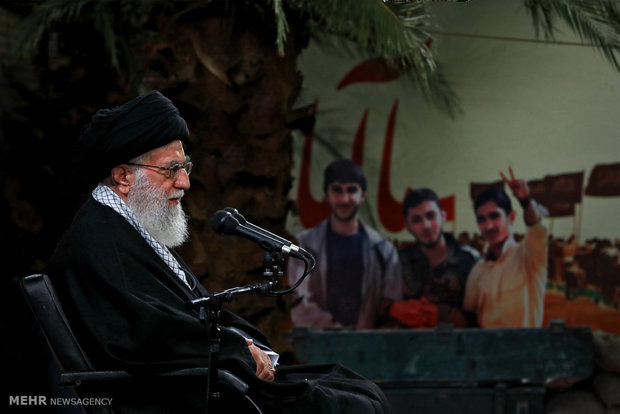Ayatollah Seyyed Ali Khamenei received a group of Sacred Defense commanders, warriors, and organizers of Rahian-e Noor, state-organized visits by university students and the public alike to border regions where Iran fought an imposed war during 8 years against Iraq’s Baathist Saddam Hussein in the 1980s.
Ayatollah Khamenei deemed the visits a measure and a good initiative to present the public with a cornucopia of cultural wealth; “the sole scheme to fight the cultural invasion is to draw upon this wealth of materials of the Sacred Defense and helping cultural production,” he told the meeting.
“Resistance will ultimately pay off and the enemy will retreat in ignominy; Sacred Defense is a cultural wealth which should be kept alive, as it contributed to the history of the Revolution during 1980s; why Saddam invaded Iran? They felt that Iran was in a position of weakness; they even predicted the depth of this weakness and purportedly would have dine in Tehran after 3 or 4 days,” he quoted Saddam Hussein, who was ambitious enough to be lured to such escapades.
“This is a general rule of the world: that enemies would be embolden if we admit our weakness; in economy of the modern times when they sanctioned us, this was the case. They sanctioned us because they found that Iran’s economy was not in an ideal shape to survive pressures; this was the case when in 1980 Iraq attacked Iran. At that time, Iran was actually and really weak, lacking the logistics and organized army, with no experience of a war,” Ayatollah Khamenei emphasized.
Leader denounced the critics of the Sacred Defense who waged attempts to undermine the war years and its values; “such efforts should be systematically prevented; no movie or book may undermine the achievements and culture of the Sacred Defense,” he demanded. “For a strong economy and state, culture should be strong enough to contribute to soft power of a country; cultural production should be improved in order to avoid imports of alien cultural products which would stand cacophonous to indigenous culture; the status quo when unregulated number of books and cultural products are imported is a source of grave concerns, which infested the culture,” Leader lamented.
Ayatollah Khamenei reiterated his cultural revolution as a poison by the Western powers to alienate Iranian young generation from their true identity; “cultural traps are far more damaging than conventional war and military threats; the latter makes the nation embrace for pressures, but the former demoralizes young cohort and deprives the country from its energetic minds,” he concluded.
SH/3924525
